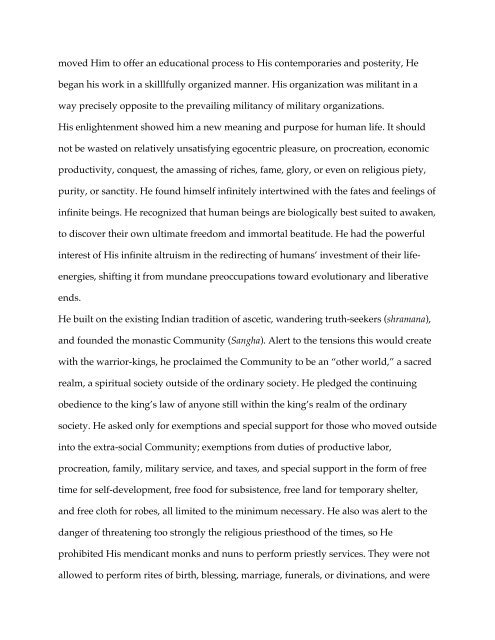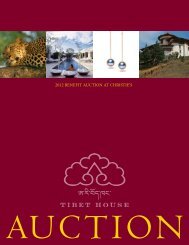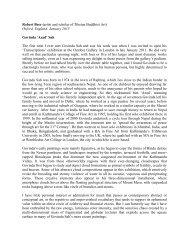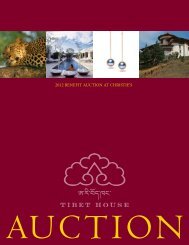Thurman, Essential Tibetan Buddhism Introduction (part) - Tibet House
Thurman, Essential Tibetan Buddhism Introduction (part) - Tibet House
Thurman, Essential Tibetan Buddhism Introduction (part) - Tibet House
You also want an ePaper? Increase the reach of your titles
YUMPU automatically turns print PDFs into web optimized ePapers that Google loves.
moved Him to offer an educational process to His contemporaries and posterity, He<br />
began his work in a skilllfully organized manner. His organization was militant in a<br />
way precisely opposite to the prevailing militancy of military organizations.<br />
His enlightenment showed him a new meaning and purpose for human life. It should<br />
not be wasted on relatively unsatisfying egocentric pleasure, on procreation, economic<br />
productivity, conquest, the amassing of riches, fame, glory, or even on religious piety,<br />
purity, or sanctity. He found himself infinitely intertwined with the fates and feelings of<br />
infinite beings. He recognized that human beings are biologically best suited to awaken,<br />
to discover their own ultimate freedom and immortal beatitude. He had the powerful<br />
interest of His infinite altruism in the redirecting of humans’ investment of their lifeenergies,<br />
shifting it from mundane preoccupations toward evolutionary and liberative<br />
ends.<br />
He built on the existing Indian tradition of ascetic, wandering truth-seekers (shramana),<br />
and founded the monastic Community (Sangha). Alert to the tensions this would create<br />
with the warrior-kings, he proclaimed the Community to be an “other world,” a sacred<br />
realm, a spiritual society outside of the ordinary society. He pledged the continuing<br />
obedience to the king’s law of anyone still within the king’s realm of the ordinary<br />
society. He asked only for exemptions and special support for those who moved outside<br />
into the extra-social Community; exemptions from duties of productive labor,<br />
procreation, family, military service, and taxes, and special support in the form of free<br />
time for self-development, free food for subsistence, free land for temporary shelter,<br />
and free cloth for robes, all limited to the minimum necessary. He also was alert to the<br />
danger of threatening too strongly the religious priesthood of the times, so He<br />
prohibited His mendicant monks and nuns to perform priestly services. They were not<br />
allowed to perform rites of birth, blessing, marriage, funerals, or divinations, and were





